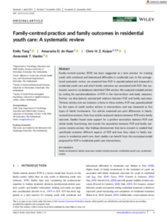Family-centred practice (FCP) has been suggested as a best practice for treating youth with emotional and behavioural difficulties in residential care. In this preregistered global systematic review, the authors examined how FCP is operationalized and measured in residential youth care and which family outcomes are associated with FCP. Their systematic search in six databases identified 5784 articles. Their analyses included articles by coding the operationalizations of FCP in the interventions and study measures. Further, they descriptively summarized relations between FCP and family outcomes.
Thirteen articles met their inclusion criteria. In these articles, FCP was operationalized by five types of youth worker actions in interventions and was measured as five types of family involvement. Ten articles examined pre–post differences in familycentred interventions. Only four articles analysed relations between FCP and a family outcome. Studies found some support for a positive association between FCP and whole-family functioning, but overall, the association between FCP and family outcomes remains unclear. Their findings demonstrate that more research is needed that specifically examines different aspects of FCP and how they relate to family outcomes in residential youth care. Such studies can benefit from the conceptual model proposed for FCP in residential youth care interventions

